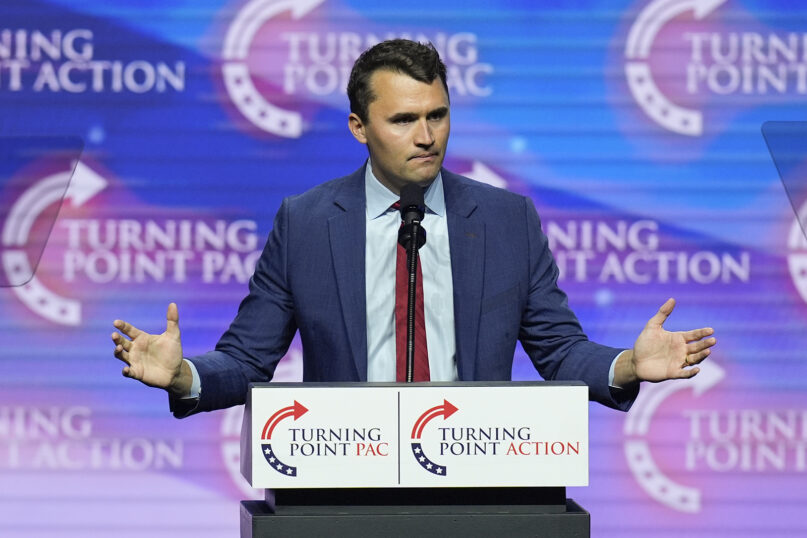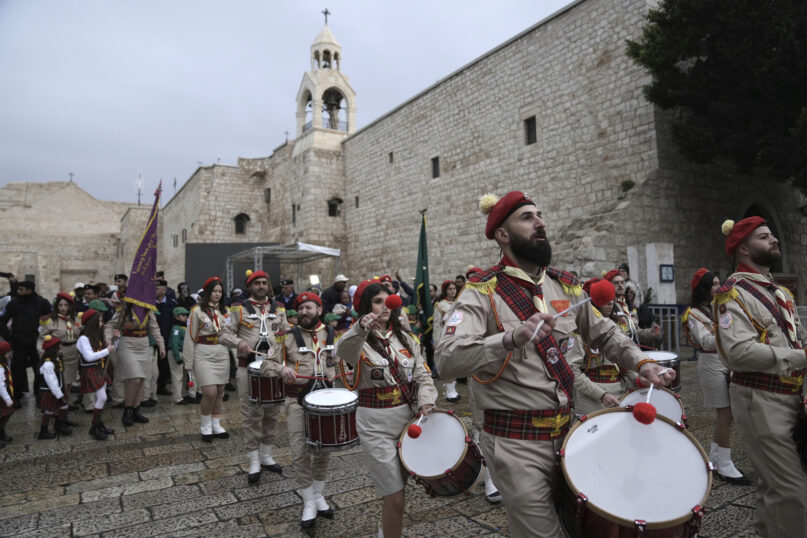(RNS) — During a recent campus Q&A, a Palestinian Christian student discussed U.S.-Israel relations with Charlie Kirk, executive director of evangelical Christian activist group Turning Point USA. Kirk asked the student at one point: “As me as a Christian, do you think it would be safe for me to walk the streets of Bethlehem without armed guards?” When the student confidently answered yes, Kirk rolled his eyes in disbelief.
That moment wasn’t just factually dubious — it was revealing. Kirk’s unspoken suggestion was that Palestinian Muslims are inherently hostile to Christians, ignoring the student’s affirmation — and the reality in Bethlehem — that, in the very town where Jesus was born, Christians continue to worship freely and have maintained an unbroken presence for two millennia. Suggesting otherwise, Kirk exposed a worldview shaped by fear and ideology.
The same posture is echoed by the Trump administration’s nominee to be ambassador to Israel, former Arkansas governor and evangelical pastor Mike Huckabee. At his March 25 confirmation hearing before the Senate Foreign Relations Committee, Huckabee was asked about achieving a lasting peace between Israelis and Palestinians. He responded in part, “There has to be some recognition that there will be a change in the policy of educating (Palestinian) children to hate Jews.”
This is a slanderous distortion that vilifies an entire people. I was raised in the Palestinian education system in Bethlehem, was taught by Christian and Muslim educators alike and grew up forging friendships with people of all faiths, including Jewish and Messianic Jewish believers with whom I now partner in gospel ministry. If the curriculum I learned had taught hatred, it clearly failed.
Contrary to Huckabee’s testimony, and the caricatures often presented in Western media, Palestinian youth in Bethlehem and elsewhere in the West Bank are not raised on a curriculum of hate. Yes, they learn about the Nakba, when Palestinians were forced out of what is now Israel. They learn the history of the reality they know firsthand: the ongoing occupation and the complex realities of checkpoints and land restrictions. But various Palestinian educators make active efforts to cultivate peace, critical thinking and coexistence.
Organizations such as Bethlehem Bible College offer academic and experiential programs to equip young people with the tools of nonviolence, restorative justice and cross-cultural understanding. Musalaha, a ministry rooted in biblical reconciliation, has worked for decades to bring together Israeli and Palestinian youth through camps, leadership development and storytelling. These and countless others are not signs of indoctrination, but signs of resilience and a longing for a just peace.

Turning Point USA Founder Charlie Kirk speaks before Republican presidential nominee former President Donald Trump during a campaign rally at Thomas & Mack Center, Oct. 24, 2024, in Las Vegas. (AP Photo/John Locher)
Huckabee’s and Kirk’s statements are not isolated gaffes; they come out of a shared ideological framework that fuses theology with geopolitics. At its core is the belief that Israel is not only a strategic American ally, but a moral extension of the West itself. By contrast, Palestinians are portrayed as inherently antisemitic or culturally regressive, unworthy of equal moral consideration. This binary narrative not only erases the complexities of the region, but it also dehumanizes millions of people — Christians like me as well as my Muslim neighbors — simply because we are Palestinian.
I was born and raised in Bethlehem. I’ve walked its streets my entire life — as a child, a minister, a father and a community leader. It was not my Muslim neighbors or fellow Palestinians I’ve feared, but the Israeli military patrols that entered our neighborhoods: tanks rolling down our streets, soldiers storming homes in the dead of night, armed with automatic rifles and impunity, the so-called “home-mapping operations,” in which soldiers invade Palestinian homes under the pretense of collecting layout data, leaving behind terrorized families and traumatized children.
I’ve seen that violence up close. An Israeli soldier once shot my mother in the back — unprovoked, without warning. I’ve buried teenage friends killed by Israeli fire. These weren’t terrorists. They were kids. They were neighbors. They were human beings. The fear we live with isn’t imagined — it’s lived. And yet we are the ones portrayed as dangerous.
Kirk, if he had any curiosity about Palestinians or Bethlehem, would know that the city is led by a Christian mayor, as are the leaders of several West Bank cities. The Palestinian Authority not only allows this; it mandates Christian leadership in places like Bethlehem to reflect the heritage and dignity of the local Christian population.

Palestinian scouts march during the Christian Orthodox Christmas Eve celebrations at the Church of the Nativity in the West Bank city of Bethlehem, the traditional birthplace of Jesus, Jan. 6, 2023. (AP Photo/ Nasser Nasser)
Christians make up just 2% of the West Bank’s population, but through quiet, faithful presence, our impact reaches far beyond our size. We help operate nearly one-third of all health care services, lead nearly half of the region’s NGOs, and serve in high-level government roles. Today, four Palestinian Authority cabinet members are Christians — including the official spokesman of the PA. Church-run organizations also rank as the third-largest employer in the occupied territories, providing vital services and jobs across communities. Ours is not a story of power, but of perseverance. We are few, but we are faithful, and our witness is undeniable.
Nobody would say Palestinian society is perfect. Our failures include corruption, political stagnation and factionalism, as well as the erosion of democratic life. More grievously, armed resistance has devolved into horrific violence, the killing of innocent Jewish civilians and the terrorizing of entire Israeli communities. These realities have disillusioned our people and betrayed the hope for dignity and justice.
But these internal failures, however serious, must never be used to justify military occupation, collective punishment or the denial of our basic rights. A people’s imperfections do not nullify their humanity. We must face our own brokenness — even as we cry out against the injustice done to us.
In the Gospel of John, when Nathanael hears about Jesus of Nazareth, he asks, “Can anything good come out of Nazareth?” Philip’s reply is timeless: “Come and see.”
To Charlie Kirk, Mike Huckabee and every Christian taught to fear my people and my city — come and see.
Come walk the streets of Bethlehem. Come visit the churches, clinics and classrooms. Come worship with Palestinian believers who still cling to Jesus in the very place he was born. Come meet the Muslim community of Bethlehem, who has hosted countless pastors, Christian leaders and mission teams and welcomed them to speak about Jesus.
Come meet the living stones — not just the ancient ones.
When Kirk says he doesn’t feel safe in Bethlehem, it isn’t a commentary on our city. It’s a reflection of a theology that prefers ideology over incarnation and fear over fellowship.
Bethlehem doesn’t need guards. It needs truth-tellers, bridge-builders and gospel witnesses who will refuse to demonize their fellow believers simply because they carry the name Palestinian.
The gospel didn’t begin with political power or military dominance. It began in a manger — in occupied Bethlehem.

Fares Abraham. (Courtesy photo)
(Fares Abraham is a Palestinian American evangelical minister and the president of Levant Ministries and now leads several ministries across the Middle East to strengthen gospel witness and promote peace. The views expressed in this commentary do not necessarily reflect those of RNS.)















